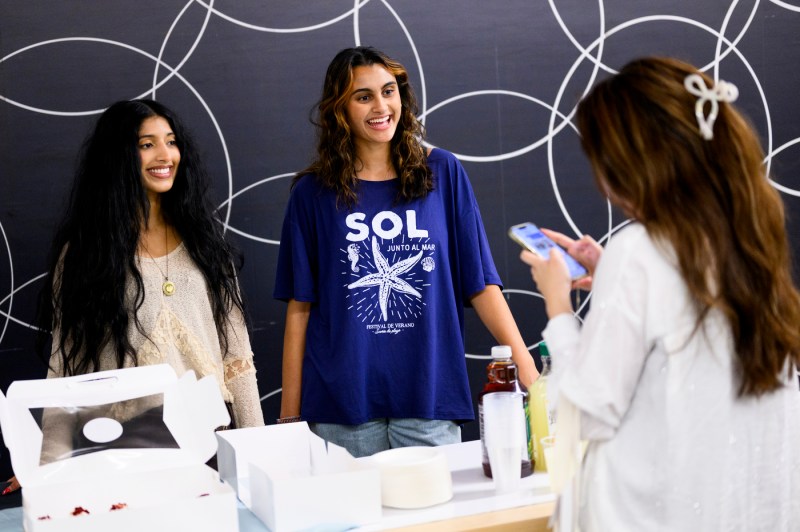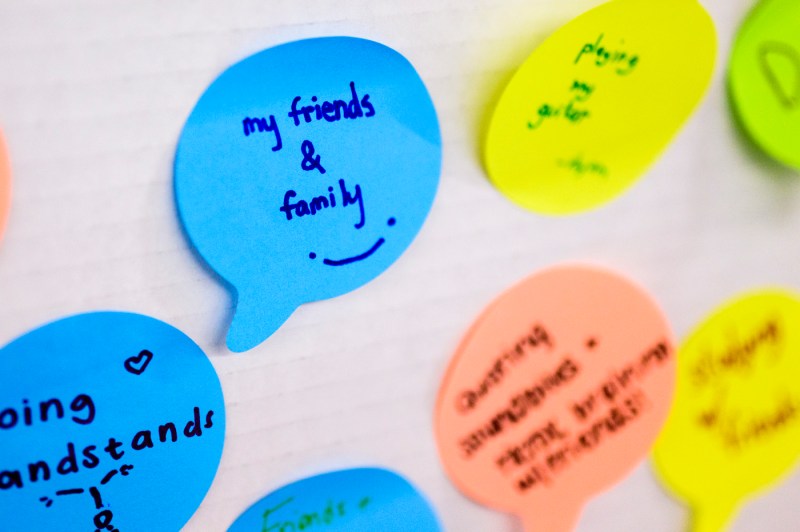Don’t worry, be happy? This club says look to the science instead
Happiness can be elusive. The Happiness Cup wants to change that.

People are always chasing happiness, whether it’s through buying trendy accessories like a Labubu or unplugging from social media.
Two Northeastern University students thought: Why not turn to science to figure out what truly brings happiness and make it a practice in their lives?
Sameerah Nawaz, a fourth-year economics and business student, and Nishita Vyas, a fourth-year business administration student, decided to do just this when they founded The Happiness Cup, a new student organization at Northeastern dedicated to spreading joy and promoting the science of happiness.
“A large part of our proposition is not that it’s necessarily difficult for people to be happier in their day-to-day lives, but rather that there’s a large wealth of research out there just not compiled in one area,” says Vyas. “We would love to be that one-stop place for students on campus and staff and other people where they can get all that information from us.”





The idea for The Happiness Cup came to the two co-founders/presidents in spring 2024.
“We realized there were a lot of avenues here at Northeastern to teach students how to be happier and the importance (and science) behind well-being,” says Vyas. “We thought it could be a really smart (idea) for us to create a club like this.”
The Happiness Cup is focused on both helping people better understand how to be happy and spreading positivity throughout campus. The club has three “projects”: the Kindness Project, which is focused on uplifting the Northeastern community through small gestures of appreciation; the Giving Project, which focuses on working with community organizations to help those in need; and the ReWire Project, where they share science-backed advice on how to be happy.
The club’s biweekly meetings are devoted to the ReWire Project. At each one, the students discuss a different aspect of happiness that they decide on with the help of their executive board. Their research team then pulls together the information they need to present, focusing on proven methods backed by science and data. They rely on research papers, as well as podcasts like The Happiness Lab and books on the science of happiness. They also send members their resources after meetings.
So far, the group has discussed how the world’s happiest countries have more gender equality (done with FEMPOC, a feminist club for people of color), how nutrition affects happiness and how exercise can release chemicals to improve your mood. For the latter, the club leaders encouraged members to go out and exercise more to see whether it led to improved happiness.


Editor’s Picks
So far, the group has discussed how the world’s happiest countries have more gender equality (done with FEMPOC, a feminist club for people of color), how nutrition affects happiness and how exercise can release chemicals to improve your mood. For the latter, the club leaders encouraged members to go out and exercise more to see whether it led to improved happiness.
Through the Kindness Project, The Happiness Club throws Kindness Days once or twice a month in which they share sweet treats and notes of affirmation. They’ve also teamed up with other student organizations, most recently for a joint meeting and yoga class with Active Minds Northeastern.
They’ve also partnered with outside organizations such as Back Bay Mental Health, working together to make finals survival kits with goodies like stress balls and tips for studying.
“We not only want to be a hub for Northeastern students, but for the Boston community overall,” Nawaz says. “As we further grow our giving project and kindness project, we’re looking to see if there’s ways we can further impact and improve the Boston community and we’re looking forward to future partnerships.”
Outreach has been a huge component of this. Nawaz says they’ve done their own research in finding groups to collaborate with. Additionally, they try to collect data from their events as well to see if their efforts are working in making students happier (and they are).
The club is also making an impact with its membership. It has over 100 members on its mailing list and over 300 Instagram followers since launching in the spring.
“We were able to grow the club,” says Nawaz. “Not that many people were in it when we first started, but we found with events, we had a lot of students who were interested in joining. We really focused on tabling. We pretty much tabled three times a month and just tried to get people to know more.”










